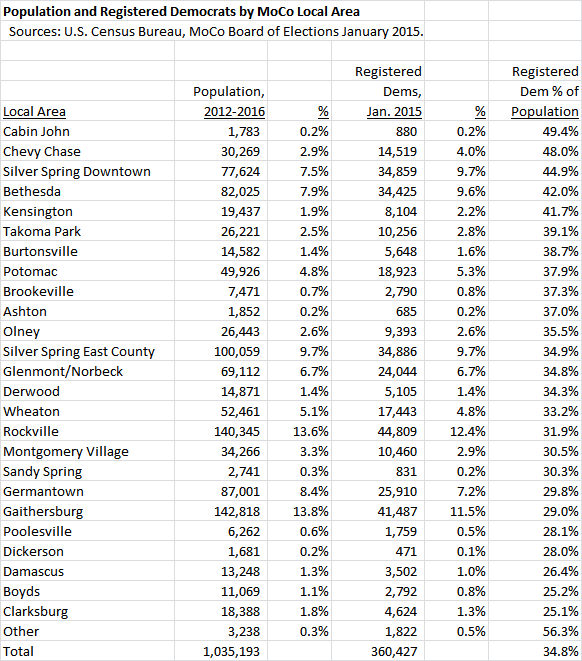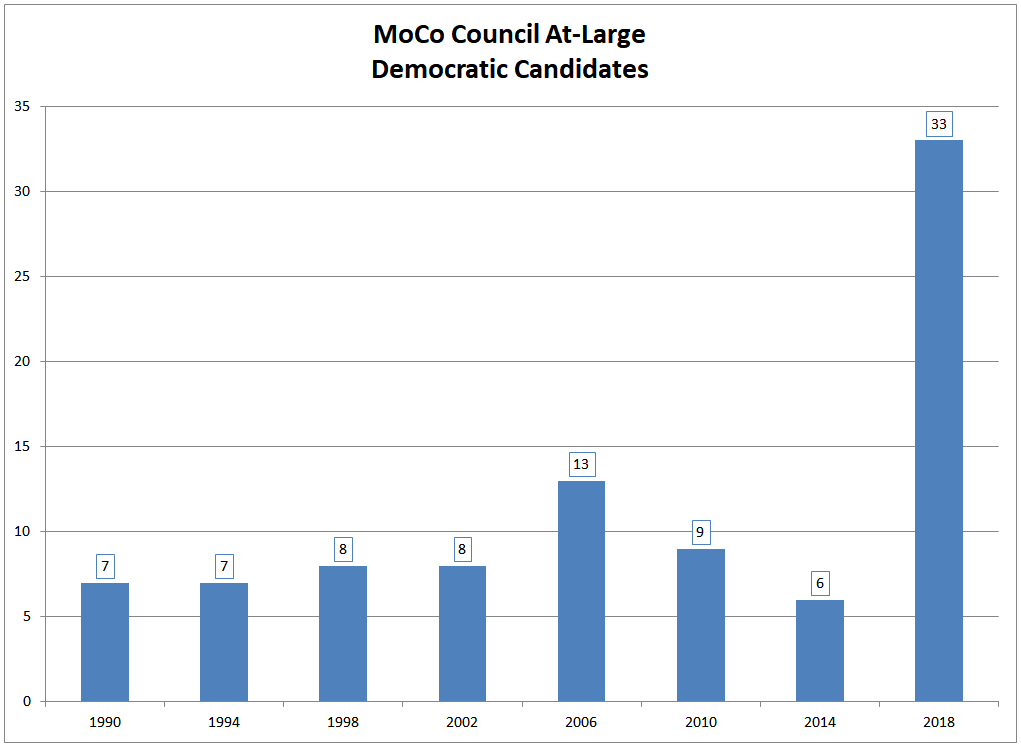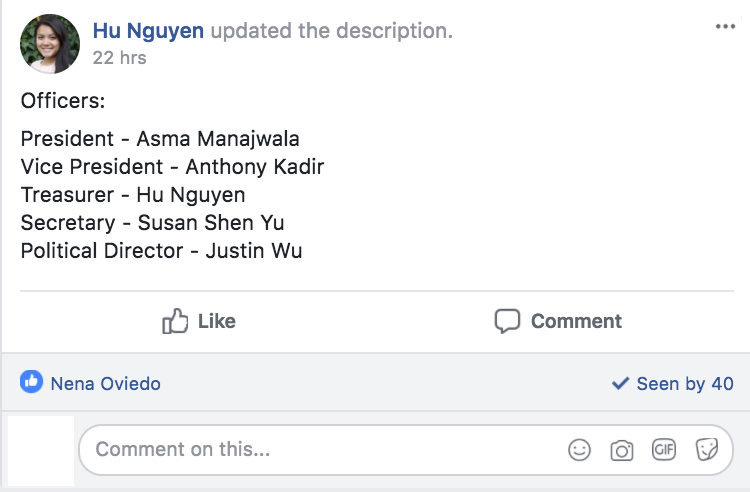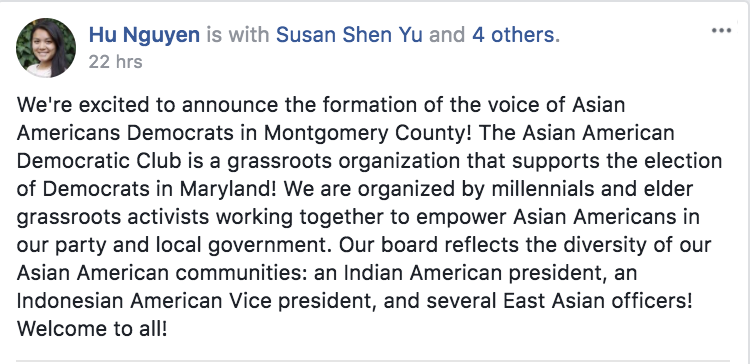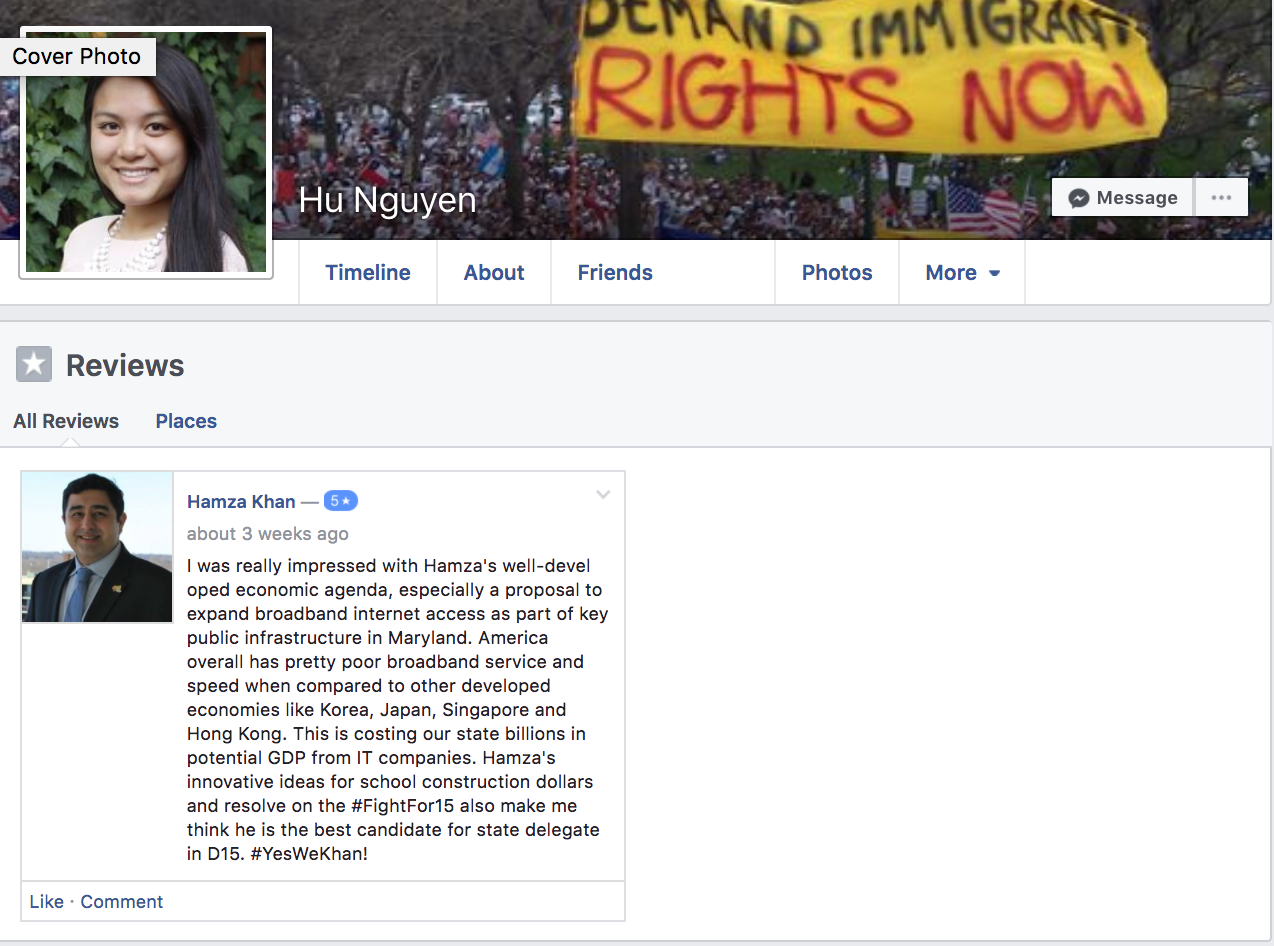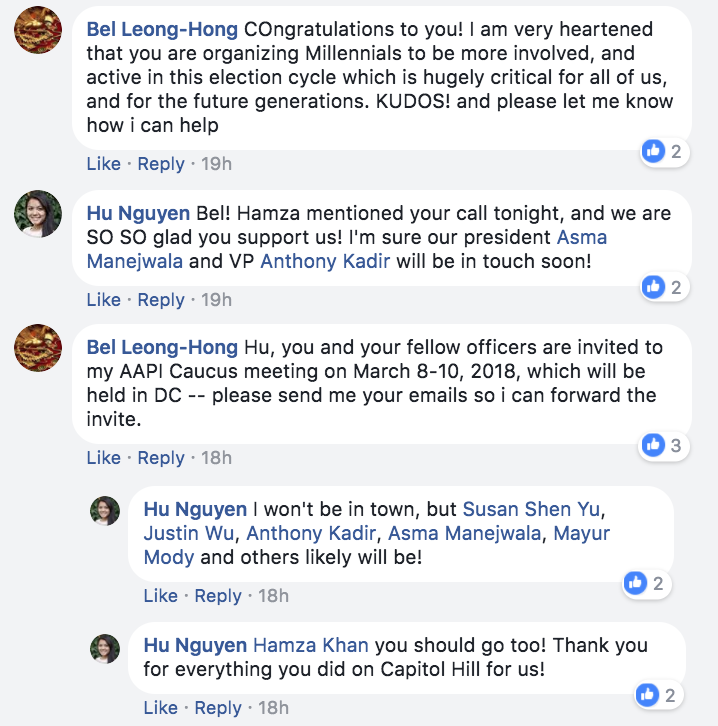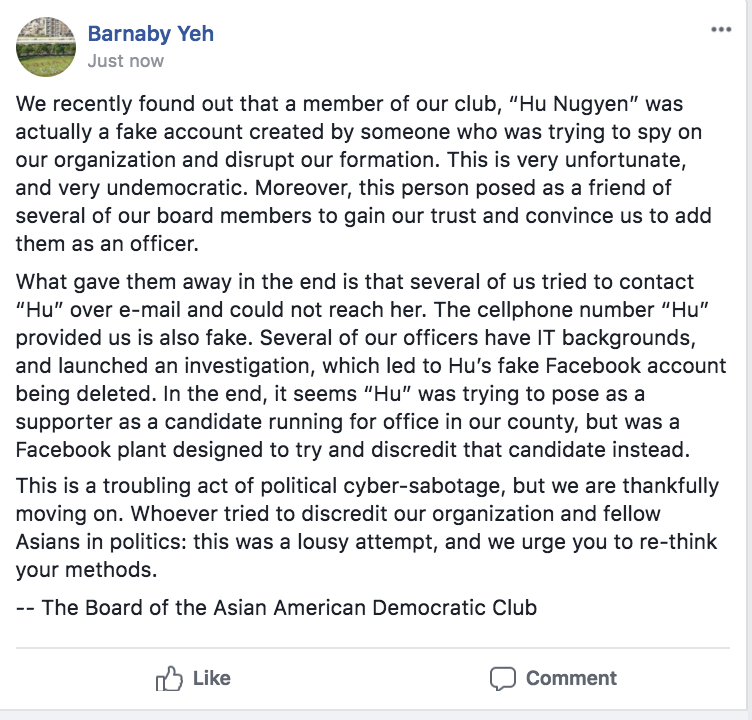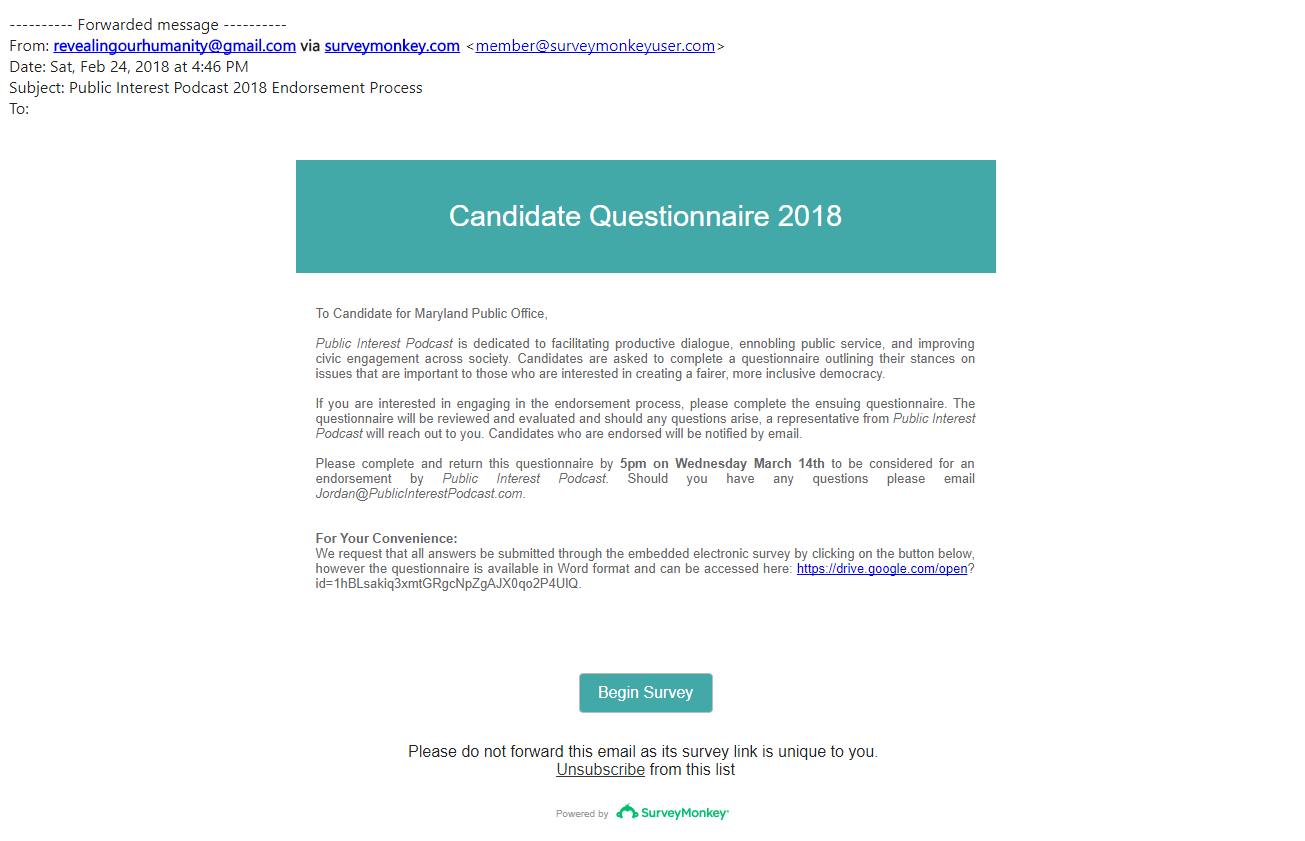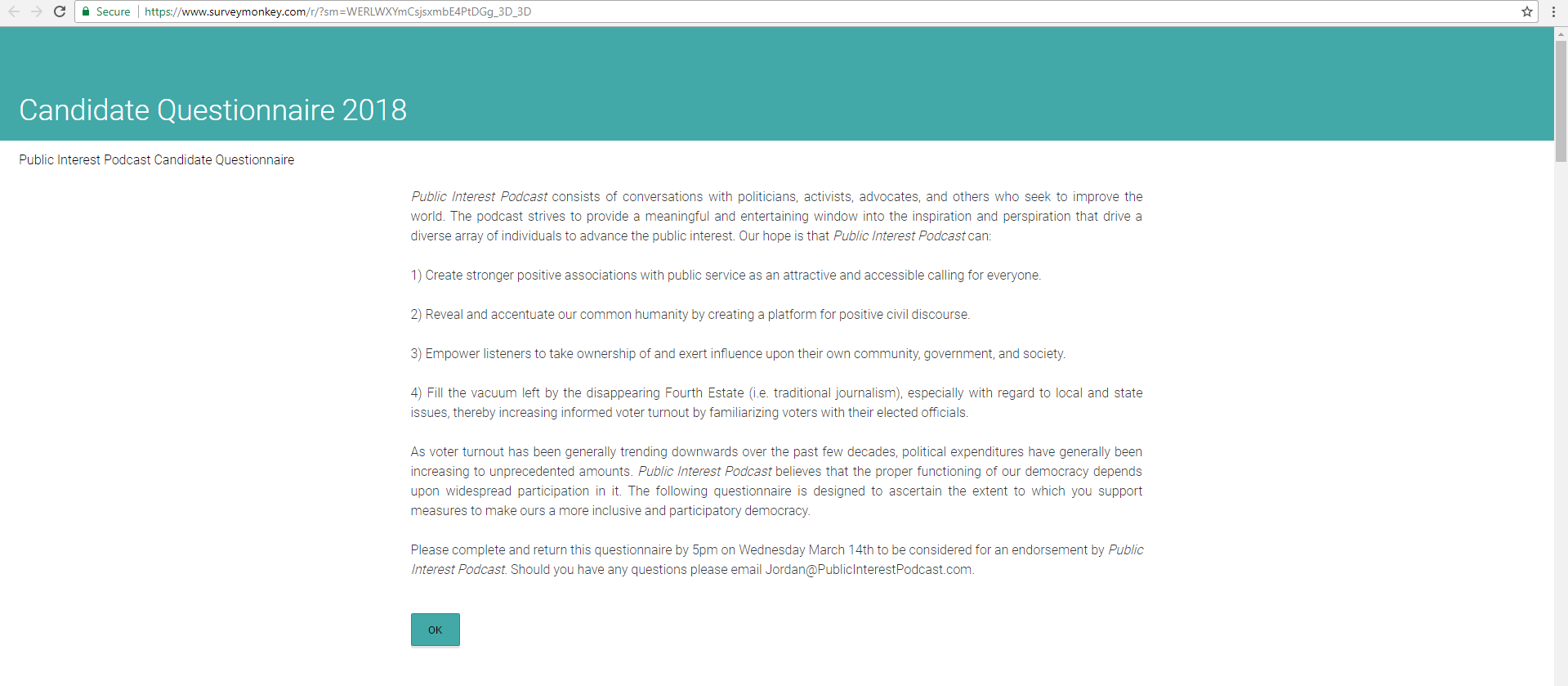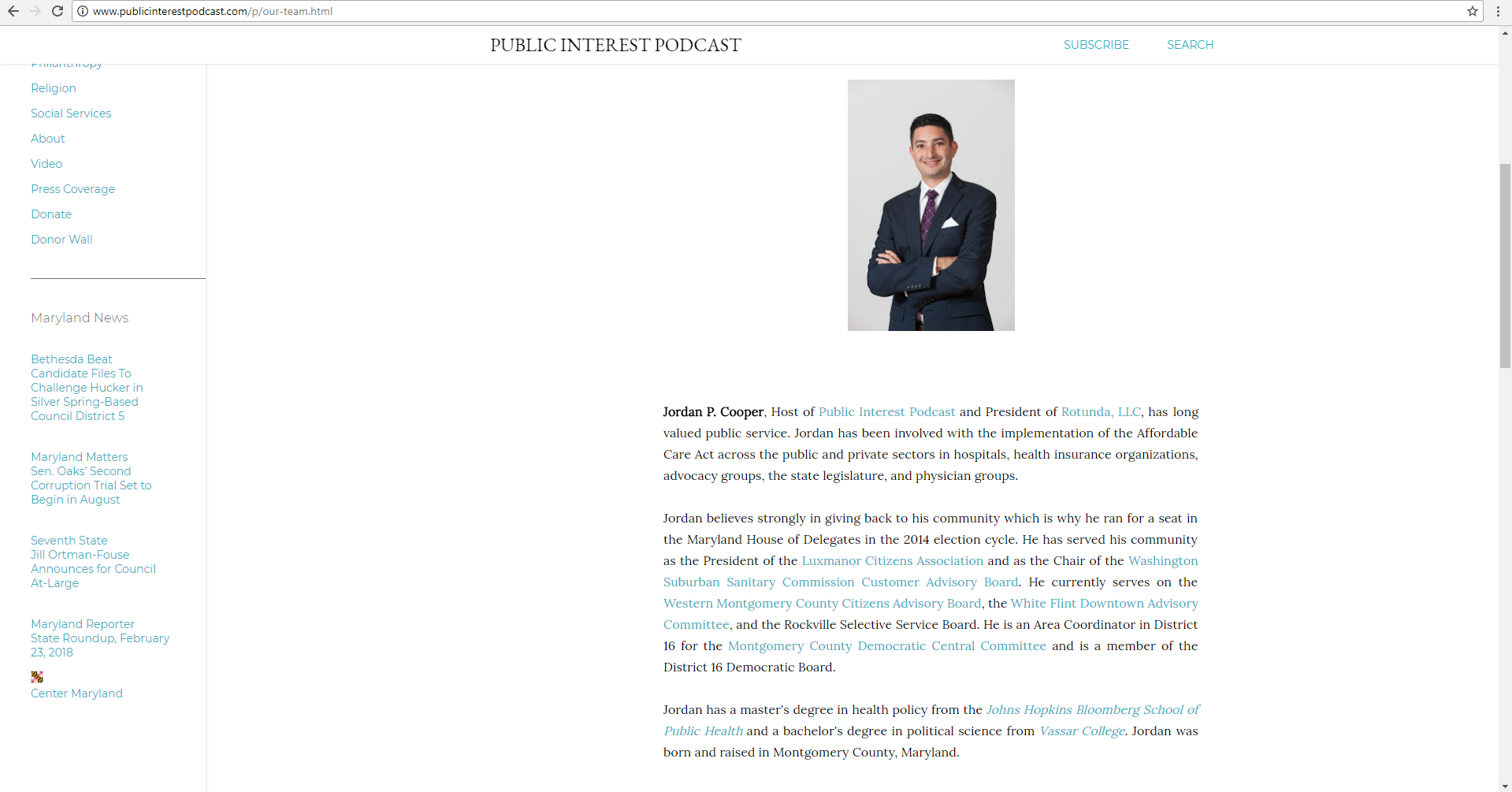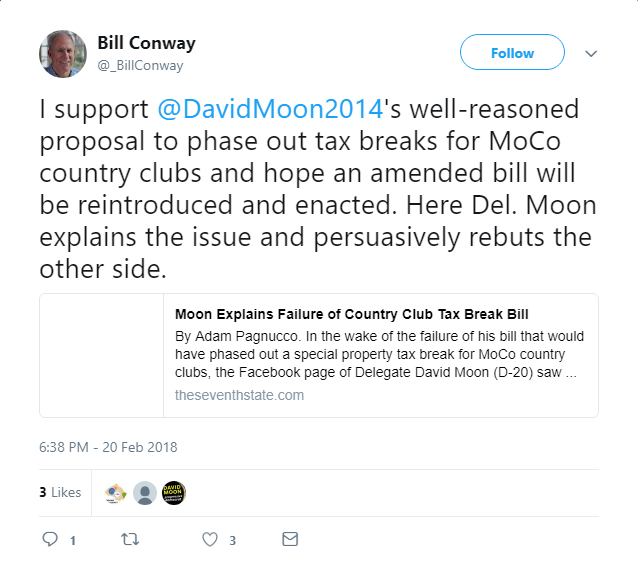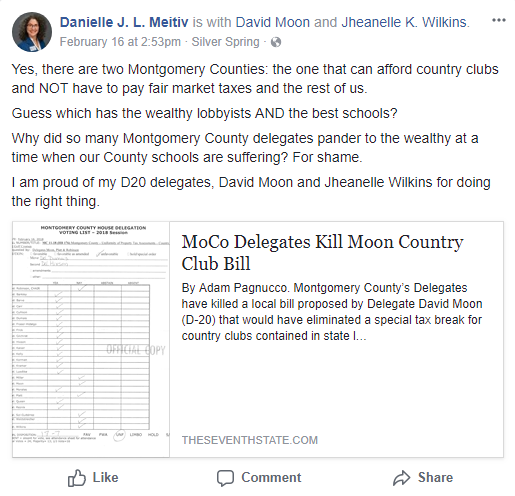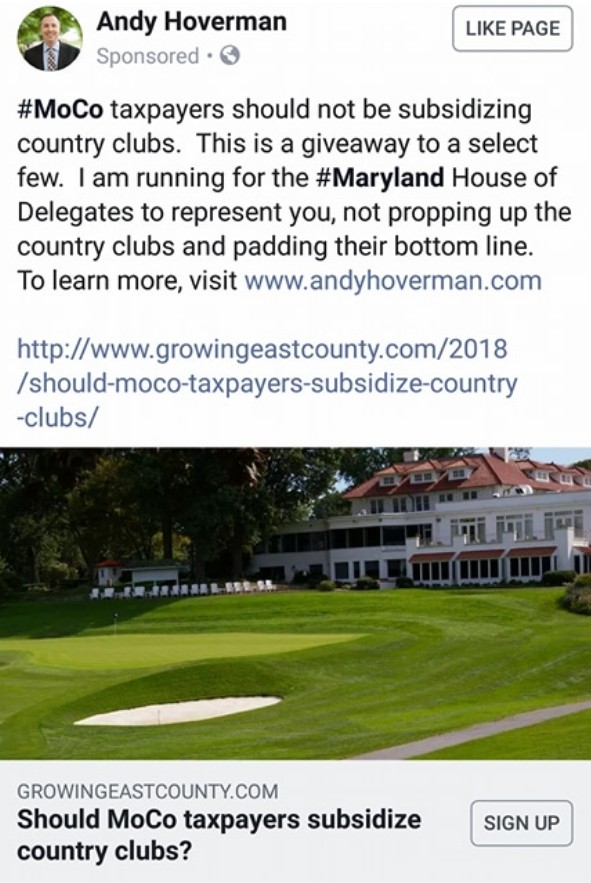By Adam Pagnucco.
For many months, rumors have abounded about the Democratic establishment seeking to find a primary challenger to its hated nemesis, Comptroller Peter Franchot. But at the close of candidate filing, it became clear that the effort to oust Franchot had failed. The Comptroller has no Democratic opponent, and with only an unknown Republican running against him, Franchot is certain to get four more years in office.
Among the statehouse’s leadership, Governor Larry Hogan is regarded as a rival but not a bitter enemy. That’s because since the Governor is a Republican, a certain amount of political competition is expected. Franchot, on the other hand, is despised by the Annapolis Democratic ruling class. As a Democrat and a former twenty-year Delegate, someone in Franchot’s position would normally be expected to be a loyal player on Team Dem. Instead, the Comptroller is the leader of Team Franchot – a team with different interests and tactics than Team Dem – and the leaders revile him as an apostate.
Understanding Franchot requires breaking out of the conventional political box – something the Comptroller specializes in. Here are four facts about Franchot that players in state politics should recognize.
He Has Built a Thirty-Year Career on Rebellion Against Authority
Let’s go back to 1986. District 20 State Senator Stewart Bainum was leaving his seat to run for Congress. Two Delegates, Ida Ruben and Diane Kirchenbauer, ran for the open Senate seat. But Ruben was not content to go to the Senate – she wanted to control the entire district. So Ruben put together a slate including incumbent Delegate Sheila Hixson, MoCo Democrat of the Year Robert Berger and former Takoma Park City Council Member Lou D’Ovidio. Franchot, then a young aide to Massachusetts Congressman Ed Markey, was having none of it. He launched an aggressive door-knocking campaign for Delegate running against lobbyists, greedy banks, insurance companies and “special interests” of all kinds. Franchot finished first in the Delegate race, surpassing even Hixson, and learned an early lesson: revolting against the establishment, both political and economic, could be electorally rewarding.
Franchot targets special interests in a 1986 mailer.
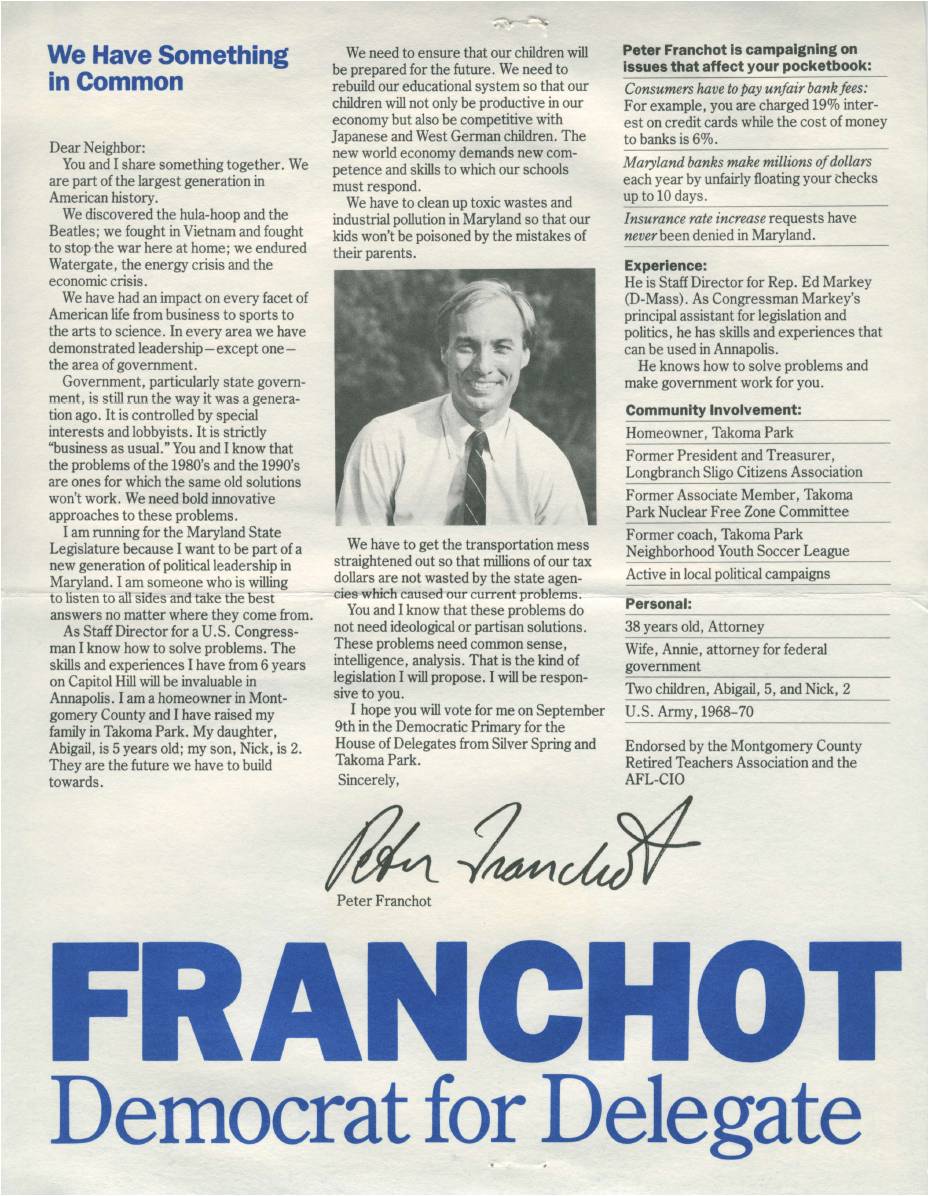
That was just the beginning. Two years later, Franchot ran a tough and occasionally negative race against the new darling of moderates in MoCo, Congresswoman Connie Morella. (This is the only race Franchot would lose.) In 1992, Franchot backed an ill-fated coup attempt against House Speaker Clay Mitchell. Mitchell’s rival, Nancy Kopp, would go on to be rehabilitated, but Franchot was sent so far to the back of the bench that he could have been sitting in a Bay Bridge toll booth. After the 2002 election, Franchot began running against Mister Maryland, Comptroller William Donald Schaefer, and even took out a $750,000 loan on his house to do it. After winning an upset victory, Franchot then fought with Governor Martin O’Malley and the legislature’s presiding officers over slots and other issues all the way through Hogan’s election. And the fight goes on over craft beer.
Here is a partial list of all the establishment figures Franchot has taken on in the last thirty years: two incumbent Delegates in his home district, a popular Congresswoman, multiple House Speakers and the Senate President, a sitting Democratic Governor and one of Maryland’s most influential all-time political figures in Schaefer. No other politician has assembled such a list and survived. And yet here is Franchot, more than thirty years later, with no primary opponent.
He Champions Non-Partisan Issues
Think of some of the issues Franchot has taken on in the last decade: opposition to slots, cracking down on fraudulent tax returns, getting air conditioning in Baltimore County schools, opposing MoCo’s liquor monopoly, moving the start of school until after Labor Day and liberalizing state laws on craft beer. These issues seem like an eclectic set but they have two things in common. First, none of them are partisan or ideological issues. Folks in the left, right and middle can agree on many of them. And second, the constituencies in opposition are attractive opponents to have: casino conglomerates, tax cheaters, corporate mega-beer producers and incompetent bureaucrats. To quote former Illinois Governor Rod Blagojevich, from a political perspective this is [expletive deleted] golden. Franchot has picked up allies and admirers in all these fights who range all over the political spectrum and will never desert him. How many Maryland politicians can make that claim?
Moreover, despite the contempt that the establishment holds for Franchot, he has had his share of wins. Pressure from Franchot and Hogan has helped accelerate Baltimore County’s school construction program. Hogan’s executive order on school openings after Labor Day, a Franchot idea, has gone unchallenged. Last year, Franchot got a major tax fraud bill passed through the General Assembly. And the current efforts to put slots money in a lockbox for education is a big vindication for Franchot, who has argued for a decade that gambling money was not used for schools as promised but has instead been poured into the general fund. We will see how his current craft beer crusade turns out.
He Lacks Ambition and Fear
Most politicians are driven by ambition and fear. Ambition, typically manifesting as a drive for higher office, causes politicians to take risks, stand out and appeal to critical interest groups. Fear can be healthy when it aids self-preservation, including fear of being disliked, embarrassed, ostracized or losing an election. The behavior of most politicians involves a competition and balance between these two competing traits. In a sense, Franchot has neither of them.
Franchot’s absence of fear is obvious. The scathing denunciations of Franchot by O’Malley, the legislature’s presiding officers, the Baltimore Sun editorial page and various dukes and barons of Annapolis would scare the living daylights out of most politicians. Not Franchot. He not only doesn’t care; the confrontations actually energize him. Your author has seen him grin and rub his hands together in glee at the prospect of taking on folks whom he would call “bullies and bosses.” No other influential figure in state politics acts like this.
But here’s the thing: Franchot also lacks any ambition for higher office. He figured out some time ago that Comptroller is a great job. Franchot doesn’t have to vote on controversial bills, draft budgets, raise taxes or say no to constituents. He gets to travel around the state, hand out awards to small businesses, get involved with issues of his choice and, as long as tax refunds go out quickly and efficiently, he can do all of the above as long as he likes. So he isn’t going to run for Governor, Congress or anything else. That frees up Franchot from having to compete for all of the Democratic interest group support he would need in a competitive primary with quality opponents. That means he gets to set his own agenda in a way other politicians can’t. And boy, that has been a major asset to him.
The Establishment Handles Him Terribly
If you’re a leader in the Democratic establishment, there are only two ways to deal with the occasional and inevitable Franchot eruptions. You can ignore them. You can co-opt them. Sometimes you can do both. But whatever you do, don’t take on Franchot directly. Then he gets to fight “bullies and bosses,” and either gets his way or he gets to be martyred in front of legions of adoring supporters. Either way, he wins.
The recent craft beer fight is a good example of mishandling Franchot. Maryland’s alcohol laws are notoriously anti-competitive, although they have very slowly begun to liberalize. Franchot rightly criticizes the state’s beer franchise laws, which essentially establish state-sanctioned distribution cartels, and he ridiculed a requirement in a bill passed last year that craft breweries send some of their beer to distributors and buy it back before serving it in their tap rooms. Then he set up a task force to give his proposed beer law reforms legitimacy and had his army of craft beer supporters descend on Annapolis. What to do?
The rational response would be to ignore and co-opt. From a strictly political perspective, the establishment should have given Franchot’s bill a polite hearing but otherwise ignored it. Then they should have extracted pieces from it that the distributors could live with, pass those in a separate bill sponsored by state legislators who could use a bump, and declare victory. Franchot would declare partial victory too, but who cares?
But this is Franchot so rationality went out the window. Instead, the leaders put forth two bills: one to retract the improvements the craft breweries won last year and another to form a task force to study whether the Comptroller’s alcohol regulatory authority should be taken away. The establishment’s reward was an all-day hearing that degenerated into a searing circus featuring angry and sputtering Delegates, militant craft beer advocates, allegations of payoffs through booze industry political contributions and a starring role for Franchot who got to denounce “back room deals.” They gave Franchot exactly what he wanted: a swarming sea of fans and HUGE press attention. How exactly is this supposed to encourage him to behave differently in the future?
Franchot preens like a peacock before press and supporters outside the House hearing room where his craft beer bill was discussed. Credit: Franchot’s Facebook page.
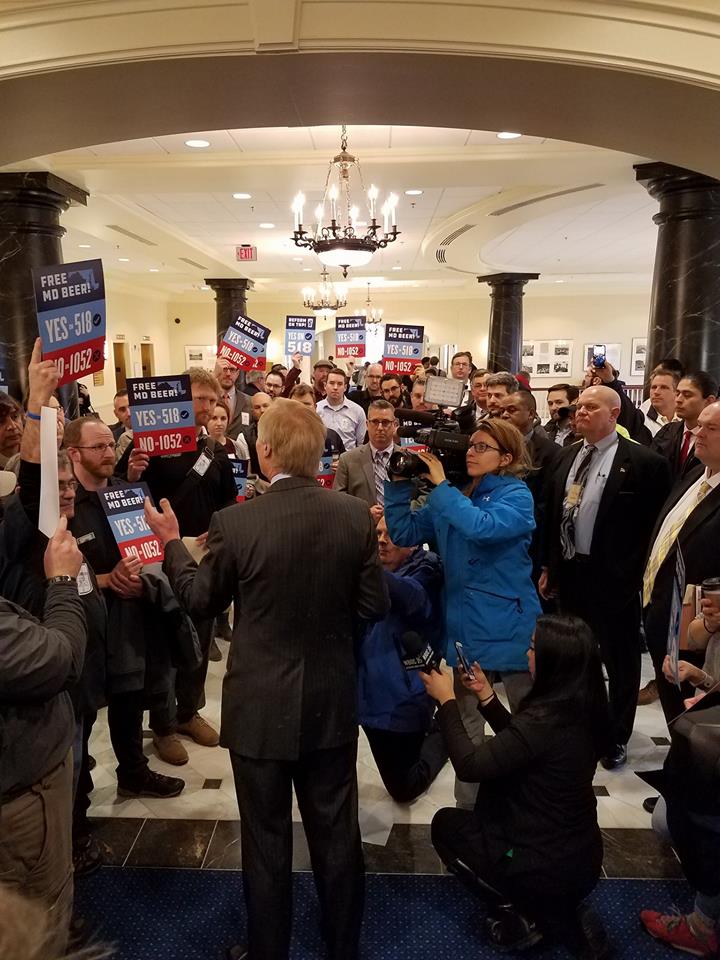
The Bottom Line
There are 188 members of the General Assembly. The place needs hierarchy to operate. There must be organization, leadership, direction and consequences for violators. Otherwise, nothing would get done. All of this means that if the establishment didn’t exist, we would have to create one.
That said, establishments decay and become obsolete when they go unchallenged. There’s a valuable role for disrupters like Franchot: they keep the leadership on its toes and make sure issues that do not originate solely within favored interest groups get addressed. This push and pull keeps the place vibrant and relevant and, over the long run, makes it better.
The leadership may not always like that. But they’re going to have to deal with it, at least for another four years.
Disclosure: The author has done campaign work for Peter Franchot in the past but has not worked on his current campaign on craft beer.


